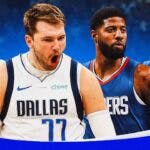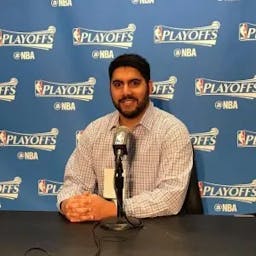LOS ANGELES – The first round playoff series between the L.A. Clippers and Utah Jazz is a going to be a battle between two teams who like to play two completely different styles. One team likes to get out in the open court and get baskets on the fast break, while the other, well, is the exact opposite.
In a league that has teams playing faster with more possessions than ever before, a few teams stick to playing the old-school way of running a half-court offense; the Jazz are clearly one of those teams. When looking around the league at different teams and the pace at which they play per 100 possessions, the Clippers are in the middle of the pack (17th in the league) averaging 98.2 possessions per game. Their opponent, the Jazz, are dead last in the NBA owning 93.6 possessions per game.
Clippers head coach Doc Rivers, who won the Western Conference Coach of the Month award for April while leading his team to a 5-0 record, is very much aware of the system Utah plays with and what they intend to do against his team in the upcoming series.
“We have to try to play our pace,” explained Rivers. “Utah has perfected forcing teams to play at their pace, and they've done it very well, and so we want to play like we want to play. That's what we want to do in this series.
“We have to rebound. They're big, we have to rebound the ball. We can't give them extra shots.
For the Jazz, it's the same model they've followed since the hiring of head coach Quin Snyder following the third worst season in franchise history in 2013-14. In each of the three years under Snyder, Utah has owned the lowest possession average per game (92.8 possessions per game in 2014-15, 93.3 per game last season, and 93.6 per game this season).
Snyder's defensive and creativity over the last couple seasons has earned him high praise from his counterpart in Doc Rivers.
“I just think he's really creative,” said Rivers regarding Snyder. “Like he's smart, creative, intense, quirky. His teams play great defense and they're very disciplined offensively. Out of timeouts, he's one of the better [coaches]. I have an amazing amount of respect for him.”
With Snyder at the helm, only 13.2% of Utah's shots came within the first six seconds of the shot-clock while 23.9% came in the final seven seconds of the shot-clock. On the other side, 17.7% of the Clippers' shots came in the first six seconds of the shot-clock while 18.4% of their shots came in the final seven seconds of the shot clock.
Here's a look at the difference as well as the frequency in shots between the Clippers and Jazz at different periods of shot-clock, via NBA.com/stats.


Playing with pace has been the Clippers mantra all season; they're simply better when they ignite fast breaks that lead to Blake Griffin or DeAndre Jordan dunks as well as quick three-point back-breakers from J.J. Redick. Having arguably the best point guard in the NBA in Chris Paul starting the break only further helps L.A. get easy looks in transition.
“We've got to play our way, try to force the tempo, and push the ball,” said Paul, winner of the Western Conference Player of the Month for his play in April. “When they miss shots, we play fast. That's the way we play. When teams miss, we get out in transition and that's when we're at our best.
“I don't know what their pace is. I mean they run a lot of sets and stuff like that, but once again, it's about us.”
For the longest time, the NBA Playoffs have been known as a time when the game slows down for a lot of teams and a fast-paced game becomes hard to find. Clippers' All-Star center DeAndre Jordan savors playing fast to get easy baskets, but knows a lot has to be done on the defensive end in order to spark fast-break and secondary-break opportunities.
“I think we like playing fast,” said Jordan, who will be matched up with Jazz center Rudy Gobert. “We get a lot of easy buckets playing fast, but in order to keep our pace up and run, we've got to get stops. We can't run if we take the ball out every time. So I think a lot of this series for us is going to be defense and rebounding and making it tough for those guys. They run their offense for the entire clock, so we gotta be ready to play 24 seconds of defense and then end the possession with a rebound. We've got to control the paint, can't let those guys get offensive rebounds. Then we'll be able to get out and run and get easy baskets like we want to do.
“I'm a firm believer in our half-court offense because we have a lot of sets, a lot of weapons, and guys who are so unselfish. [But] I think any time you can get an easy basket, that's what you want to go for. Doesn't matter what team it is.”
Taking on a Jazz team with the fourth-best rebound differential in the league won't be an easy task, especially since the Clippers don't usually outrebound their opponents. However, four matchups this season have shown that the Clippers are fully capable of controlling the pace and playing the way they want to. We'll see if they can do it four times and advance to the second round.




